Exploring Forgiveness in the Recovery Journey
Forgiveness is often a pivotal yet challenging aspect of healing, especially for those recovering from addiction. It serves as a powerful mechanism to unshackle one’s self from the gripping emotions of anger, resentment, and guilt, which can otherwise impede recovery efforts. In this article, we dive into the essential role of forgiveness in recovery, emphasizing how letting go of the past can pave the way for a healthier, more positive future.
The Vital Role of Forgiveness in Healing
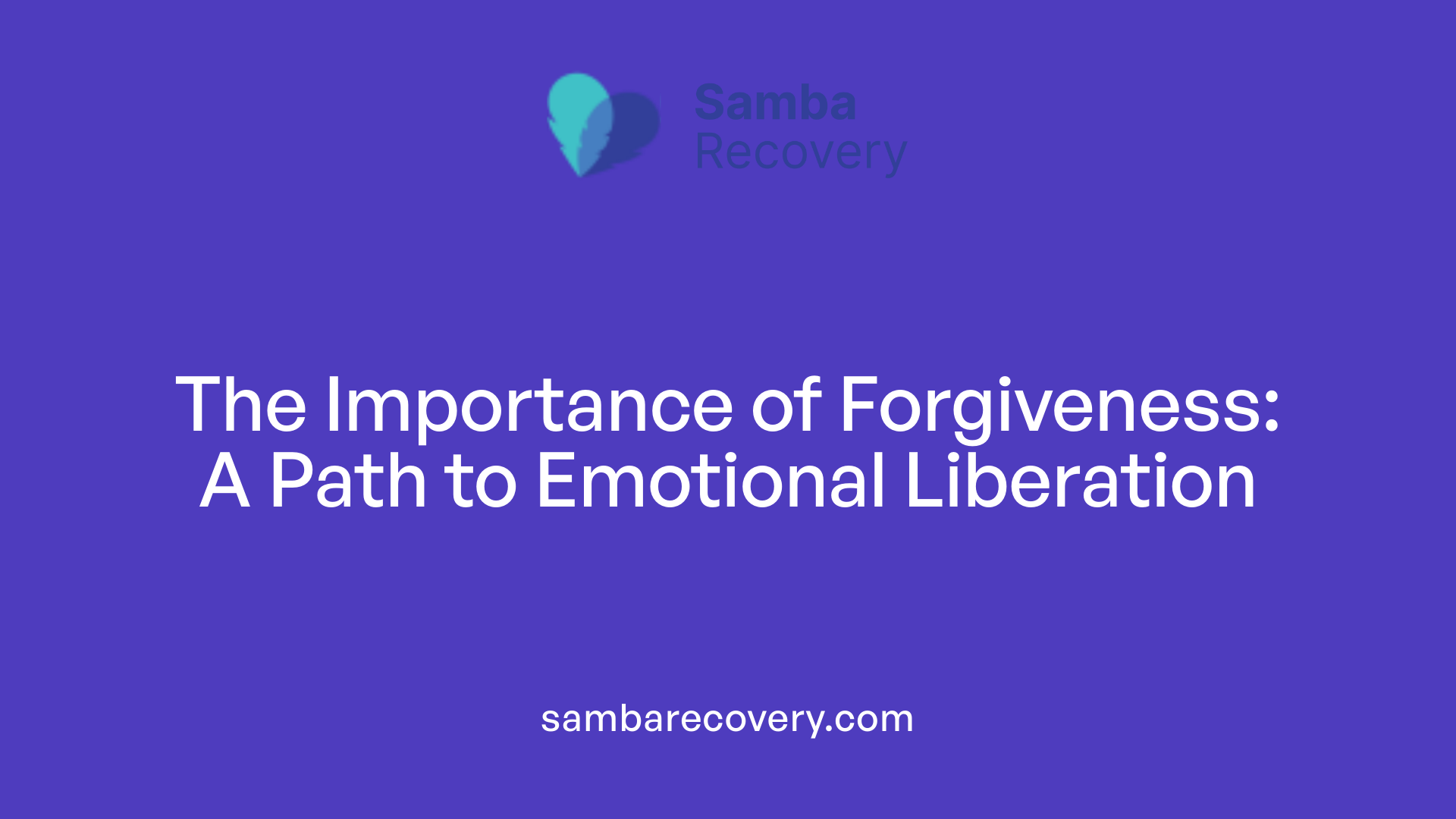
Why is forgiveness important in healing?
Forgiveness is crucial for emotional and physical well-being during the recovery journey. Holding onto resentment can burden individuals with negative emotions that may lead to health complications like high blood pressure and anxiety. The act of forgiving allows individuals to release these toxic feelings, ultimately leading to a positive impact on health and happiness.
The emotional burden of anger and bitterness can impede recovery, making it difficult for individuals to embrace their future. To illustrate this, research indicates that those who practice forgiveness experience improved mental and emotional health, including reduced symptoms of depression and anxiety.
Benefits of letting go of resentment
Letting go of resentment can foster self-esteem and enhance overall resilience. Here are some key benefits of allowing forgiveness to take root:
- Improved Mental Health: Forgiveness can alleviate feelings of guilt and shame, which often linger after addiction.
- Enhanced Emotional Freedom: It enables individuals to focus on personal growth rather than being trapped by past grievances.
- Stronger Relationships: Rebuilding trust through forgiving can establish a supportive network critical for long-term recovery.
In summary, forgiveness plays an essential role in healing by unburdening individuals from past hurt, fostering healthier relationships, and enhancing overall well-being. Practicing forgiveness not only aids in recovery but also empowers individuals to live more fulfilling lives.
Forgiveness as a Cornerstone in Addiction Recovery
What is the role of forgiveness in addiction recovery?
Forgiveness plays a crucial role in addiction recovery by facilitating emotional healing. It allows individuals to let go of guilt and resentment, making room for positive emotions and new beginnings. Those in recovery often carry the weight of past mistakes, which can lead to feelings of shame and guilt that hinder their progress.
In many recovery programs, such as Alcoholics Anonymous (AA), forgiveness is integral to the amends process. Specifically, Steps 8 and 9 encourage individuals to recognize how their behaviors have harmed others and to take both action and responsibility to repair that damage. This process involves more than simple apologies; it requires genuine efforts to demonstrate change, often through face-to-face communication with those affected.
Additionally, in cases where direct amends could cause further harm, individuals may pursue ‘living amends’—where positive changes in behavior serve as a testament to their commitment to recovery.
Overall, practicing forgiveness fosters accountability and aids in transforming feelings of shame into compassion, both for oneself and others. This emotional healing is vital for sustained recovery, empowering individuals to move forward with renewed self-esteem and resilience.
Steps to Cultivating Forgiveness in Recovery
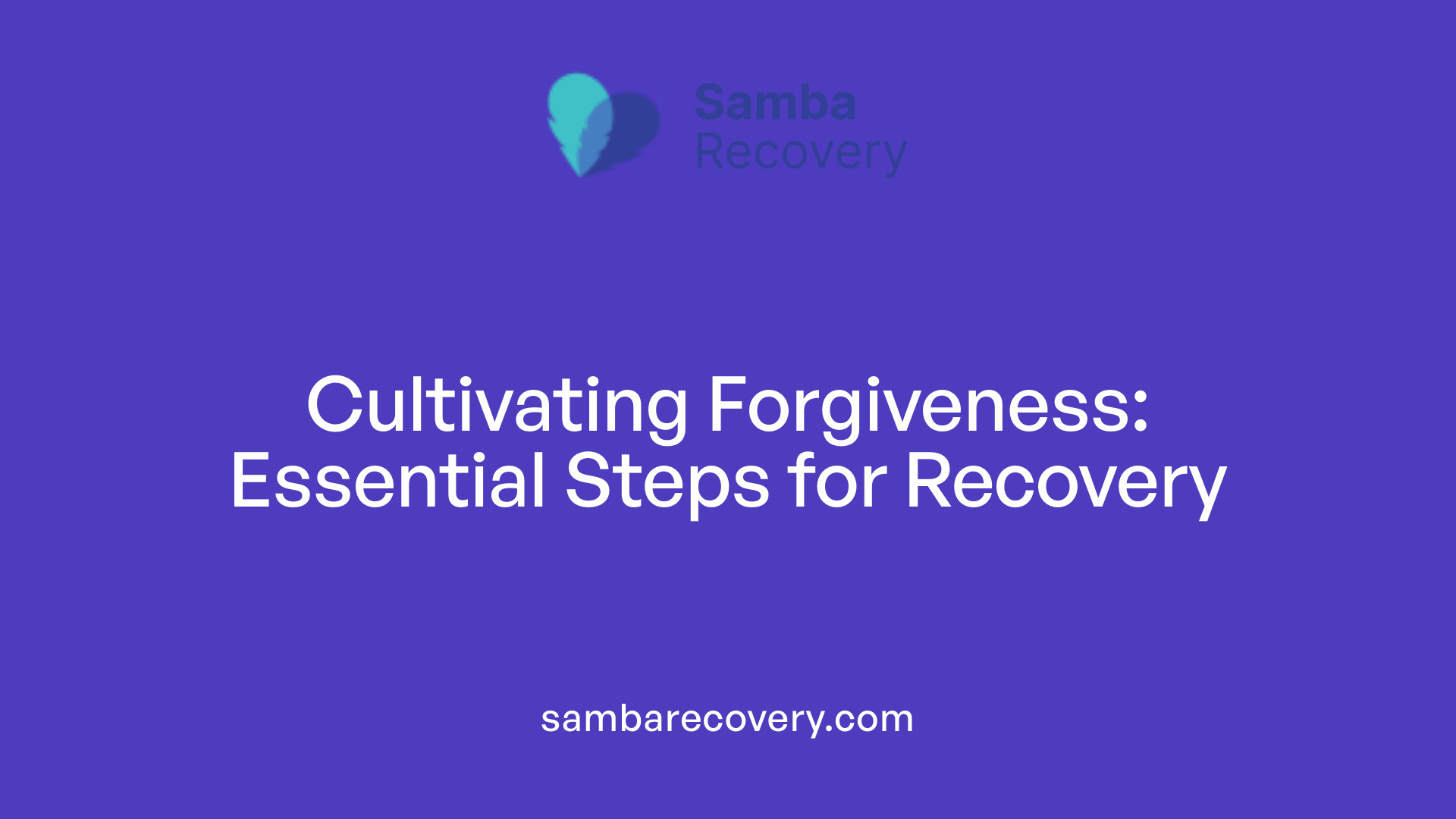
What are practical steps for incorporating forgiveness in recovery?
Forgiveness in recovery doesn’t come easily, but it is vital for personal healing. To start, individuals can acknowledge and process their feelings regarding the hurt they’ve experienced. This involves reflecting on how lingering resentments and negative emotions affect their lives.
A structured approach can also help in navigating forgiveness. One effective framework is the four phases of Enright and Fitzgibbons:
| Phase | Description | Purpose |
|---|---|---|
| Uncovering | Identifying the emotions and hurt tied to the grievance. | Understanding the depth of the pain. |
| Decision | Choosing to forgive and committing to the process. | Establishing intent and readiness. |
| Work | Actively engaging in the forgiveness process, including facing the pain and seeking to release it. | Releasing feelings of resentment and anger. |
| Deepening | Enhancing self-understanding and fostering empathy towards oneself and others. | Cultivating a healthier emotional state. |
Incorporating activities such as journaling, writing letters of forgiveness, or discussing feelings with trusted friends or therapists can further facilitate the journey toward forgiveness. Worksheets focusing on self-forgiveness and emotional acceptance are particularly valuable in healing from past grievances.
Ultimately, forgiveness is a conscious choice that necessitates time, effort, and self-compassion. Engaging in these practices can significantly improve mental health and overall life satisfaction, making them crucial components of your recovery journey.
Psychological Advantages of Forgiveness on the Path to Recovery
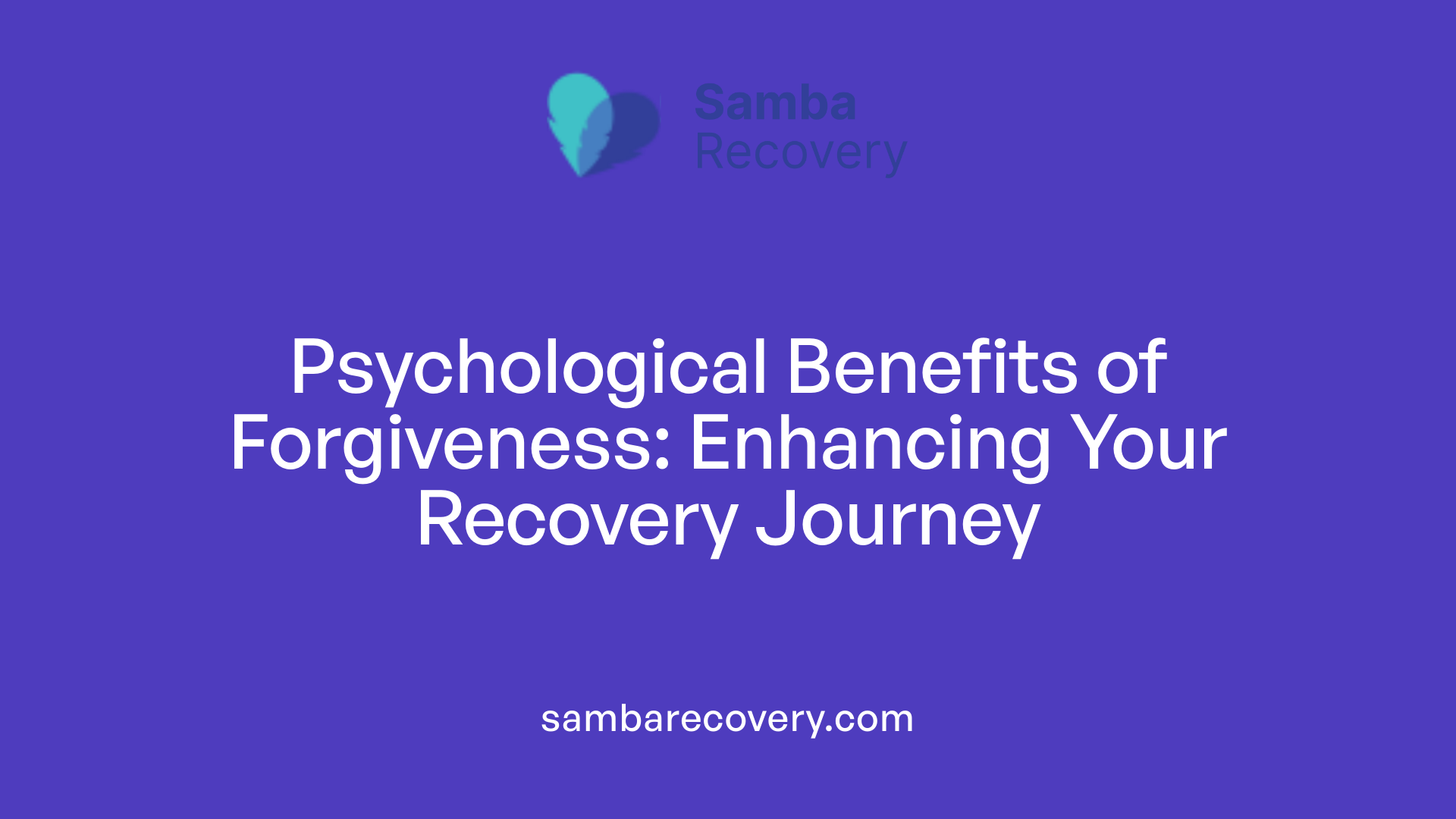
What are the psychological benefits of practicing forgiveness during addiction recovery?
Forgiveness during addiction recovery offers numerous psychological benefits. One major advantage is the reduction of anxiety, depression, and stress, which are often exacerbated by unresolved feelings of guilt and shame. By letting go of anger and resentment, individuals can improve their emotional stability and overall well-being, allowing them to focus on healing and personal growth.
A significant aspect of this process includes repairing strained relationships. Forgiveness fosters empathy and encourages open communication among loved ones, ensuring a supportive atmosphere during recovery. This reestablishment of trust can be crucial, as emotional support from a strong network contributes to long-term sobriety.
Practicing self-forgiveness is equally essential. It aids individuals in managing feelings of guilt, promoting self-compassion and resilience when facing setbacks. This act allows them to view their past mistakes as learning opportunities rather than as defining failures.
Ultimately, forgiveness cultivates a positive mindset, facilitating emotional and spiritual healing. As individuals shed the burdens of past negativity, they are empowered to build a hopeful and fulfilling future, advancing their recovery journey significantly.
The Four R’s of Forgiveness: A Framework for Recovery
Understanding the 4 R’s
The four R’s of forgiveness—Responsibility, Remorse, Restoration, and Renewal—are crucial components of the self-forgiveness process. Each R serves a unique purpose in guiding individuals towards emotional healing after experiencing shame or guilt linked to their past actions.
- Responsibility involves accepting what has occurred and showing compassion towards oneself or others for those actions. This step recognizes that mistakes are part of being human and encourages empathy rather than self-punishment.
- Remorse focuses on using feelings of guilt constructively to inspire positive change. Instead of fostering negativity, this step encourages reflection that leads to personal growth.
- Restoration emphasizes making amends whenever possible, thereby addressing the harm caused to others. Taking responsibility for past actions fosters trust and establishes healthier relationships, essential for successful recovery.
- Renewal represents the personal growth and learning that emerge from the experience. This process leads to improved mental well-being and resilience, allowing individuals to move forward with strength and clarity.
Role of Self-Forgiveness in Recovery
Self-forgiveness is critical in recovery, allowing individuals to acknowledge their past mistakes without becoming defined by them. It empowers individuals to overcome feelings of shame and guilt that can impede progress. When one embraces the four R’s, it can lead to a more compassionate self-view and a healthier mindset overall.
By practicing self-forgiveness, a framework emerges that not only aids in emotional healing but also promotes resilience and a renewed focus on personal growth, which are vital for maintaining sobriety and fostering healthier relationships.
Forgiveness Therapy: A Tool for Emotional Freedom
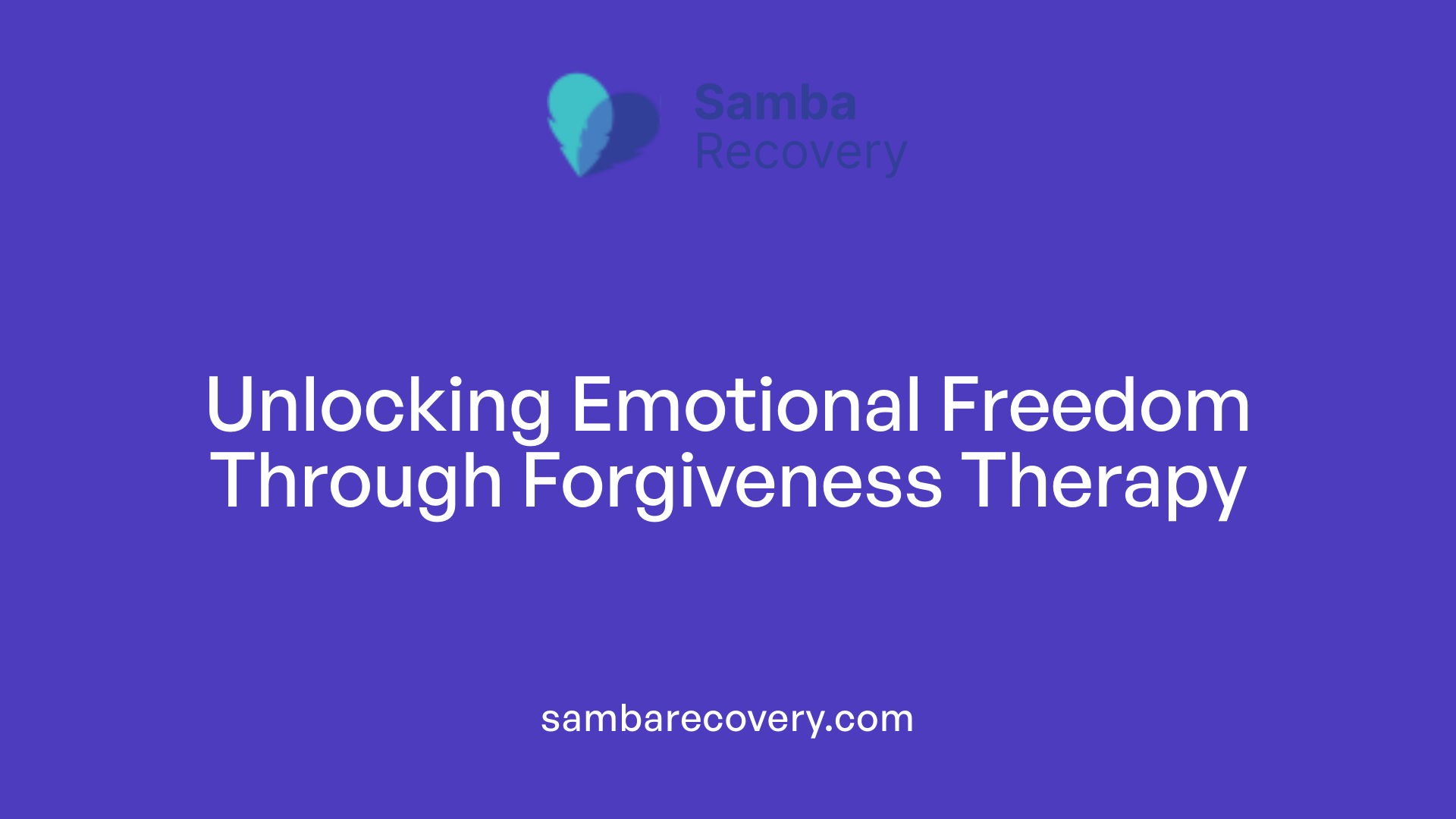
Role of Forgiveness Therapy in Recovery
Forgiveness therapy is specifically designed to help individuals within recovery processes, particularly those facing addiction. This therapeutic approach guides clients towards forgiving themselves and others, promoting emotional freedom. It emphasizes that letting go of resentment is crucial for rehabilitation, allowing individuals to face their past without being burdened by anger or guilt. In programs such as Alcoholics Anonymous, structured steps prompt introspection and the processing of harmful emotions, aiding participants in achieving forgiveness as part of their healing journey.
Empirical Studies on Forgiveness
Research substantiates the positive effects of forgiveness on emotional well-being. Studies from the Stanford Forgiveness Project demonstrate that individuals who engage in forgiveness training report significant reductions in anger and hurt feelings, directly correlating to improved mental health outcomes. Participants not only experience emotional relief but also show physical health benefits, including reduced symptoms of stress and anxiety. This data underscores forgiveness as an essential aspect of recovery, highlighting its role in fostering resilience and sustaining sobriety.
Releasing Resentment: The Enduring Impact of Forgiveness
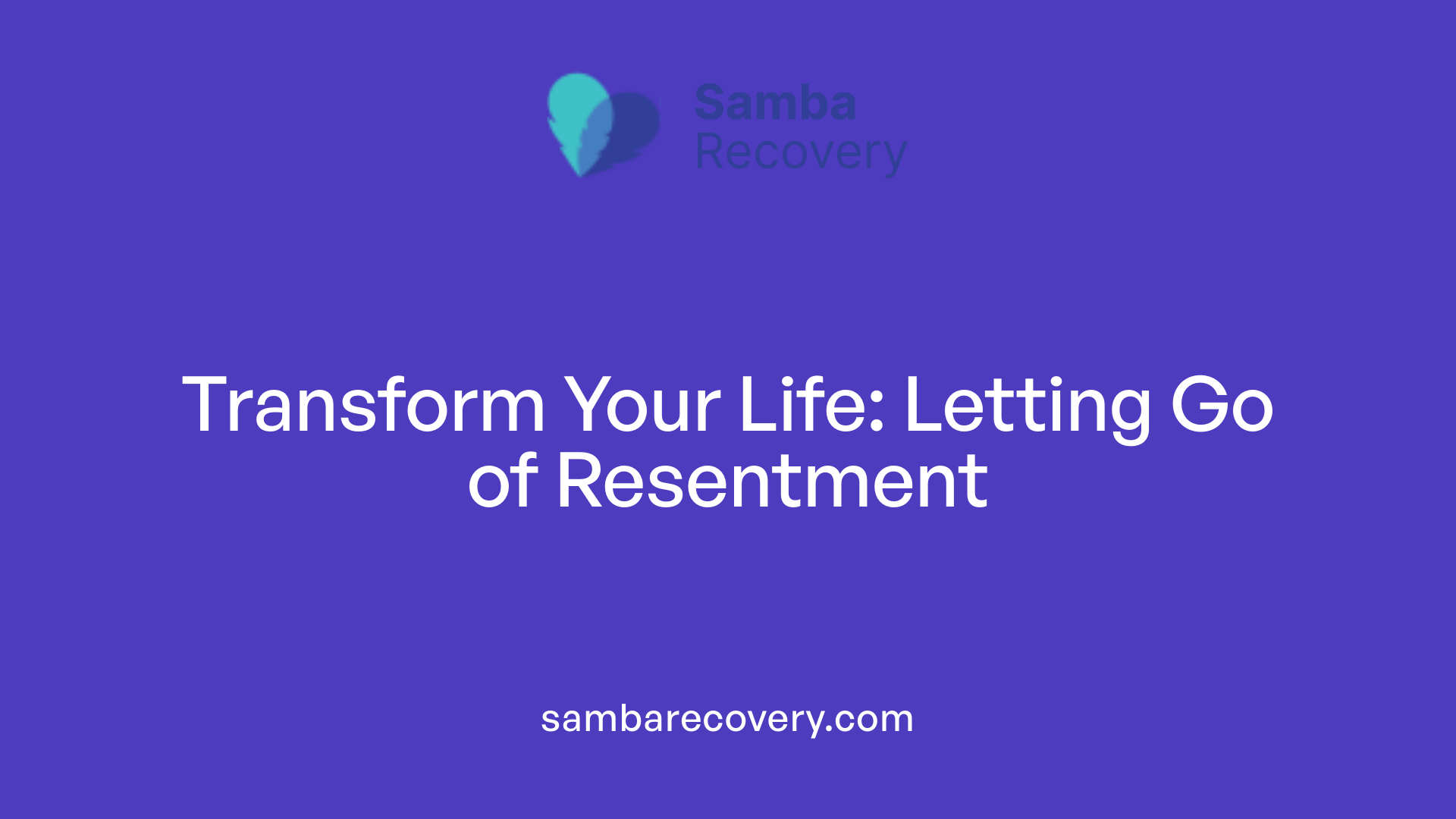
Letting Go of Past Hurts
Forgiveness is a powerful act, essential for anyone recovering from addiction. Holding onto past grievances can lead to persistent negative feelings and a victim mentality, which keeps individuals from experiencing joy in the present. When individuals choose to forgive, they release themselves from the burdens of anger and resentment, fostering a healthier emotional state. This freeing of emotional weight can significantly reduce stress, thus diminishing health risks like high blood pressure and anxiety, which are detrimental during recovery.
Transformation Through Forgiveness
The path to forgiveness transforms one’s recovery journey. It encourages individuals to view their past mistakes not as permanent markers of failure, but as opportunities for personal growth. Engaging in forgiveness allows individuals to reframe their experiences, assisting them to focus on emotional healing rather than lingering pain. Through this transformative process, individuals can improve self-esteem, enhance emotional resilience, and establish healthier relationships, creating a supportive network crucial for sustained sobriety.
Embracing Forgiveness for Lasting Recovery
The journey of recovery is deeply personal and multifaceted, with forgiveness standing as a critical component. By embracing forgiveness, individuals can move beyond the chains of past mistakes, paving the way for significant emotional healing and growth. While the path may be challenging, the process of forgiving oneself and others is essential for achieving peace, rebuilding relationships, and sustaining long-term sobriety. As we highlight the importance and power of forgiveness, may it inspire those on their path to recovery to find the strength to let go, forgive, and forge a brighter future free from the shackles of resentment.
References
- The Role of Forgiveness in Addiction Recovery
- The Impact of Self-Forgiveness and Forgiving Others in Recovery
- Forgiveness in Addiction Recovery: What You Should Know
- Forgiveness in Addiction Recovery | Self Forgiveness – BrightView
- The Importance Of Self-Forgiveness In Recovery
- The Importance of Forgiveness in Recovery | Addiction Rehab
- The Role of Forgiveness in Addiction Recovery
- How to Cultivate Forgiveness in Sobriety
- Learning The Power Of Forgiveness In Recovery
- Longitudinal Relationship between Forgiveness of Self and …






